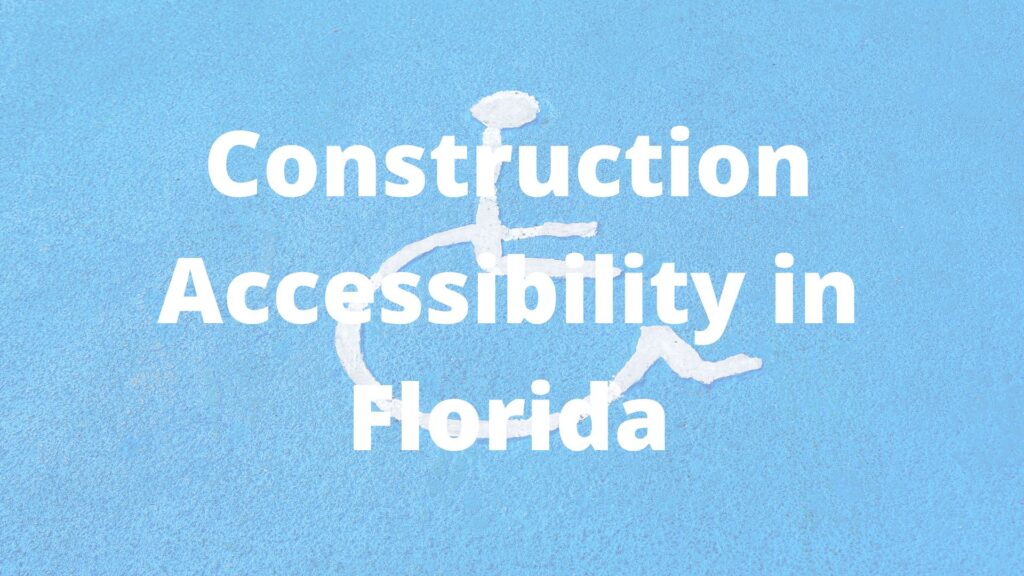
Florida’s warm climate, growing population, and large senior demographic make accessibility in construction more important than ever. The state aligns with federal laws, such as the Americans with Disabilities Act (ADA) and the Architectural Barriers Act (ABA), but also enforces the Florida Accessibility Code, ensuring a tailored approach to meet the needs of residents, businesses, and tourists alike.
What Is the ADA?
The Americans with Disabilities Act (ADA) is a federal law passed in 1990 that prohibits discrimination against individuals with disabilities in areas such as employment, transportation, and access to public buildings.
- Title III specifically mandates that all new construction and alterations of public accommodations and commercial facilities be accessible.
- Florida implements the 2010 ADA Standards for Accessible Design, enforced by both state and federal agencies.
What Is the ABA?
The Architectural Barriers Act (ABA) requires that any building constructed or altered with federal funds meet accessibility standards. This includes VA hospitals, military facilities, and some public infrastructure.
- ABA compliance is overseen by the U.S. Access Board, which issues the standards.
Legal Framework in Florida
- Florida Accessibility Code for Building Construction: Developed by the Florida Building Commission, this code incorporates the ADA but includes Florida-specific guidelines—especially for coastal, resort, and medical facilities.
- Florida Building Code, Chapter 11: Governs accessibility in all public and commercial construction.
- F.S. Chapter 553: Florida statutes related to building construction and accessibility.
Key Accessibility Requirements for New Construction in Florida
- Accessible Routes: Must connect parking, sidewalks, and public transit to entrances—even in flood-prone or coastal areas.
- Required Features:
- ADA-compliant ramps and entrances
- Accessible restrooms and signage
- Visual and audible alarms
- Pool lifts or sloped entries at public swimming pools
- Accessible parking spaces with required van access
- Employee Work Areas: Must allow access and emergency egress.
Universal Design in Florida
Florida’s emphasis on aging-in-place and senior-friendly communities makes Universal Design particularly valuable. Developers often integrate:
- Step-free entrances
- Lever handles and smart lighting
- Reinforced bathroom walls for future grab bar installation
- Open layouts that support mobility devices
Benefits of Accessibility in Florida
- Inclusivity for both residents and millions of tourists
- Compliance with ADA, ABA, and state laws
- Cost-effective design from the start
- Durability and resilience in weather-sensitive areas
In a state as dynamic and population-diverse as Florida, accessible construction isn’t just smart—it’s essential. By aligning with the ADA, ABA, and Florida-specific codes, developers can create inclusive, resilient, and future-ready spaces.
John Caravella Esq., is a construction attorney and formerly practicing project architect at The Law Office of John Caravella, P.C., representing architects, engineers, contractors, subcontractors, and owners in all phases of contract preparation, litigation, and arbitration across New York and Florida. He also serves as an arbitrator to the American Arbitration Association Construction Industry Panel. Mr. Caravella can be reached by email: [email protected] or (631) 608-1346.
The information provided on this website does not, and is not intended to, constitute legal advice; instead, all information, content, and materials available on this site are for general informational purposes only. Readers of this website should contact their attorney to obtain advice with respect to any particular legal matter. No reader, user, or browser of this site should act or refrain from acting on the basis of information on this site without first seeking legal advice from counsel in the relevant jurisdiction. Only your individual attorney can provide assurances that the information contained herein – and your interpretation of it – is applicable or appropriate to your particular situation. Use of, and access to, this website or any of the links or resources contained within the site do not create an attorney-client relationship between the reader, user, or browser and website authors, contributors, contributing law firms, or committee members and their respective employers.
Resources
- Florida Accessibility Code for Building Construction
https://floridabuilding.org/ - Florida Building Code, Chapter 11 – Accessibility
https://codes.iccsafe.org/codes/florida - ADA Standards for Accessible Design
https://www.ada.gov/2010ADAstandards_index.htm - U.S. Access Board – ABA Standards
https://www.access-board.gov/aba/ - Florida Department of Business & Professional Regulation
https://www.myfloridalicense.com/

